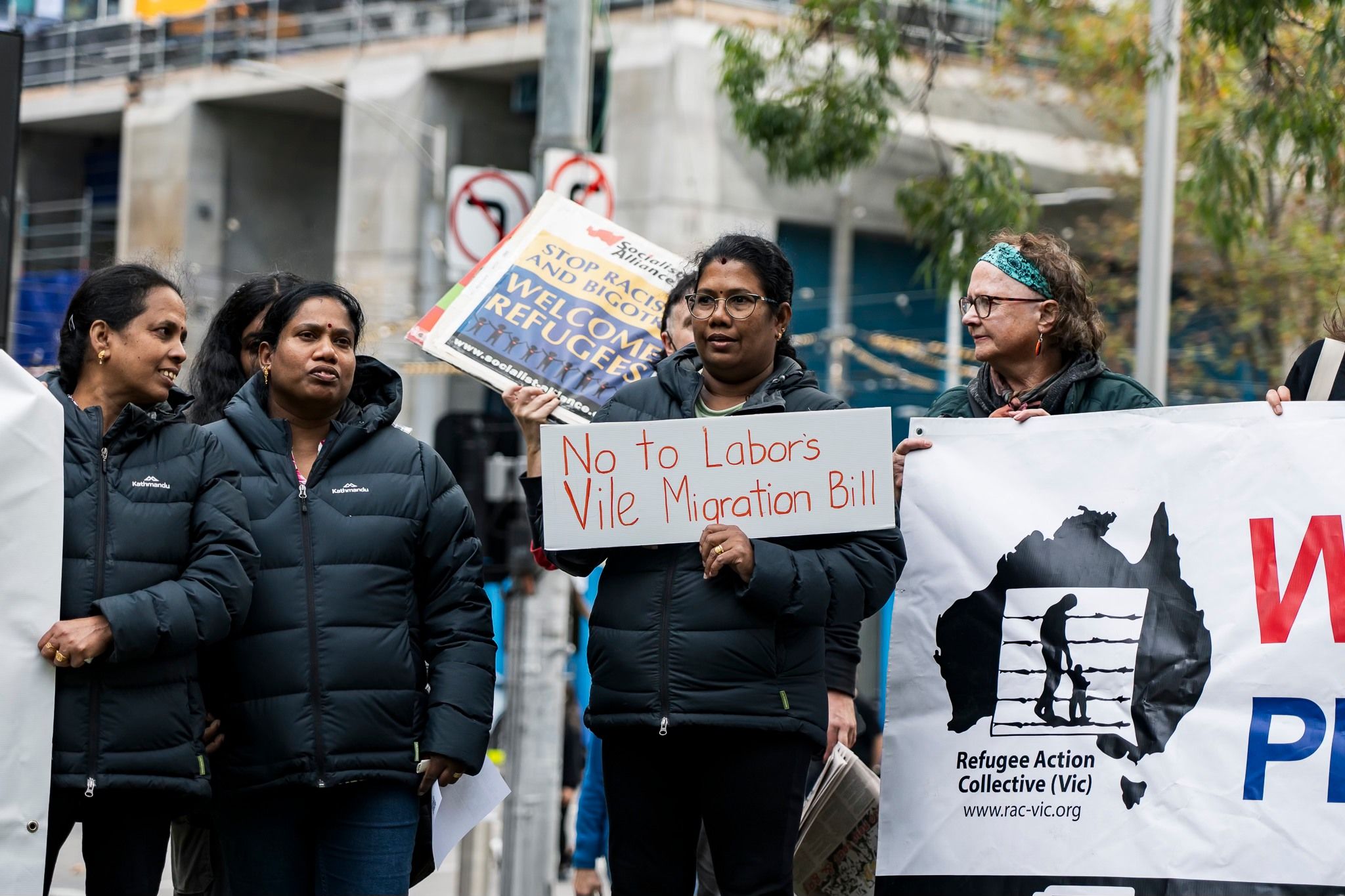A contentious new Bill proposing sweeping powers for the Australian government to impose country-wide travel bans has been labelled “racist” and “inhumane”.
The proposed legislation, which faces vehement opposition, is under scrutiny as calls grow for it to be scrapped entirely.
Protests against the Entry Ban and Deportation Bill, slated for potential Senate voting as early as Wednesday, reverberated through Sydney, Melbourne, and Brisbane over the weekend, highlighting widespread dissent. Additionally, hundreds of submissions have been made, vehemently opposing the Bill.
Introduced by the Government in March, the Bill furnishes the Minister for Immigration with unprecedented authority to enforce deportations and bar entry to individuals from specific countries.
Notably, the legislation mandates minimum prison sentences for non-citizens resisting deportation orders and includes provisions for blacklisting entire countries from new visa applications should they refuse involuntary removals.
These measures raise alarm over the prospect of far-reaching travel bans affecting nations like Zimbabwe, South Sudan, Iran, Iraq, and Russia, exacerbating concerns about the Bill’s implications and repercussions.
Zimbabwean-born CALD community activist Tich Chingombe has launched a Change.org petition calling for the Bill to be cancelled and it has already amassed nearly 1,000 signatures.
“We’ve got courts and other pathways, why aren’t we using them?” Chingombe told BACKCOVERNEWS.COM in an exclusive sit-down interview.
“This looks more political than anything… There’s about 40,000 Zimbabweans [in Australia] and most of them have done the right thing but the problem is we have to look at the situation and see that there are people who are not going to do the right thing and we have to find out why and put in measures to support them to do the right thing.”

The Bill was rushed through by Labor in March to pre-empt political fallout from the ASF17 High Court legal challenge. On Friday, the High Court ruled the indefinite detention of non-citizens who resist deportation to be lawful.
Greens Senator David Shoebridge has led opponents of the Bill, saying Labor’s proposed laws are too harsh. He compared them to the policies of former US President Donald Trump and urged Labor to reconsider.
In 2017, Trump signed an executive order that barred people from six Muslim-majority nations from entering the USA, effectively shutting out refugees. Despite facing temporary injunctions on several occasions, the US Supreme Court ultimately lifted a block on the controversial ban in 2020.
“These laws are grossly unnecessary they were unnecessary from day one. But now with this High Court decision, there is no legitimate basis apart from cruelty,” Senator Shoebridge said.
“Under this ruling, there will be a class of people who have a genuine and real fear about being persecuted if they’re returned to a country … but who have been refused by a system that everybody acknowledges is unfair.

“If they’ve been refused by that system for their asylum claim, the High Court has said there is a chance that they could be held indefinitely in detention.”
Community groups, such as the Asylum Seeker Resource Centre (ASRC) and The Human Rights Law Centre have also raised various concerns.
ASRC said the Bill is “underpinned with racism” and further marginalises certain ethnic communities while The Human Rights Law Centre said it is working to stop the Bill.
“[We] delivered expert evidence calling for these harmful and racist laws to be scrapped,” the Human Rights Law Centre said.
“With those directly affected by these laws, we will continue meeting directly with politicians to make sure they hear the message loud and clear – the Australian community won’t accept the endless punishment and criminalisation of migrants and refugees.”
Islamic Council of Victoria, President, Adel Salman, said, “This is a shameful and hurried attempt to impose harsh penalties on vulnerable individuals who have already faced significant challenges, without adequate consideration for their safety, wellbeing or personal circumstances.”
Beny Bol, President of Queensland African Communities Council, said, “The nature of this Bill and its unknown potential consequences on innocent families and community members are causing enormous high level of anxiety and confusion across the migrant communities – particularly those communities likely to be affected if passed.”
Renee Dixson, co-founder and Chair of the Forcibly Displaced People Network, said LGBTIQIA+ refugees could face particularly dire consequences.

“For those seeking asylum, returning to their countries of origin could mean risking death or imprisonment,” Dixson said.
“True protection means offering safety and refuge to those fleeing persecution, not subjecting them to further harm or punishment. We are deeply concerned about the potential impacts of this Bill and urge the government to abandon it.”
A department of Home Affairs spokesperson told BACKCOVERNEWS.COM all reasonable and appropriate efforts are made to engage countries to cooperate and facilitate the lawful removal of their nationals.
“It would be premature to name individual countries as countries of removal concern, prior to passage of this Bill,” the spokesperson said.
“Australia makes every effort to cooperate with countries in the context of the return to their home country of their nationals who have exhausted all avenues to remain in Australia.
“In practice, the removal concern country designation would be considered following significant government to government engagement on the issues and challenges of returns. The Bill includes a number of exemptions for family and humanitarian visa applicants for Australia, as well as Ministerial exceptions.
“The Bill provides flexibility for the responsible Minister to take into account the specific situation of the country concerned and to provide a tailored response where required.”

